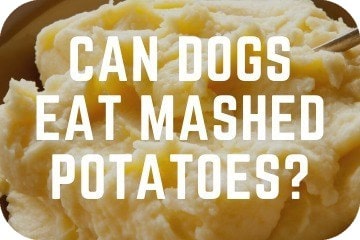
Can dogs eat mashed potatoes? It depends. Pure mashed potato is safe for dogs. However, many varieties contain added ingredients that are unhealthy, and some can be harmful.
These include dairy (such as butter, cream, milk, as many dogs struggle to digest dairy), salt, onion or garlic powder, chives, and gravy.
What should I do if my dog has eaten mashed potatoes?
- Check the ingredients, the main toxins to look for are garlic, onion, and chives.
- If these are present, determine the amount eaten and contact your veterinarian or poison helpline. If your dog has only had a little bit, most of the time, there will not have been enough ingested to cause toxic effects. However, it is always worth consulting with your vet if you are concerned. Effects can vary from breed to size, weight, and amount consumed.
- If none of these ingredients are present, the likelihood is that it is not toxic, monitor your dog carefully as they may still experience some gastric upset. If you are concerned about your dog’s behavior, contact the poison helpline or your vet.
Can dogs eat instant mashed potatoes?
Not really. Most varieties do not contain toxic ingredients (garlic, onion, chives), however, all instant or pre-made mash is high in salt, dairy, and additives, which are not recommended for your dog. It is not a healthy addition to your dogs’ diet and should not be fed.
If your dog has managed to eat some, they will probably be fine. Just check the ingredients, and if you see anything toxic, determine the amount consumed, and contact your veterinarian.
Can dogs eat KFC mashed potatoes and gravy?
Not really. KFC mash potatoes and gravy don’t contain anything known to be toxic to dogs, but it does contain a considerable amount of unhealthy and unsuitable ingredients. It is high in both salt and fat, neither of which are recommended for dogs.
If your dog has eaten some, keep an eye on them, they may experience gastric upset due to the lactose, fat content, and other unfamiliar ingredients.
Make sure you have fresh water available as the excess salt will make them thirstier and can cause salt poisoning.
If you are concerned about how your dog is behaving after eating anything unsuitable, contact your veterinarian or the poison helpline.
Busy? Get Your Hands Paws On The Answers Quickly…
- Common Ingredients And The Benefits And Risks To Dog
- Can Dogs Eat Sweet Potato Mash?
- Is Mashed Potatoes Good For Gastric Upset?
- How To Make Mashed Potatoes For Your Dog
- Dog Treats With Potato and Sweet Potato
- FAQs
COMMON INGREDIENTS AND THE BENEFITS AND RISKS TO DOGS
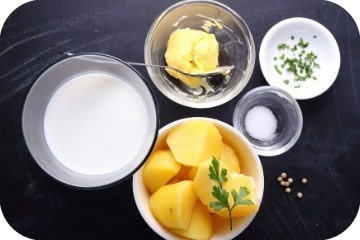
Potatoes – NOT TOXIC
Potatoes are ok for dogs to eat; they are cheap, easy to prepare, and easy to source. They are often used in grain-free or gluten-free dog foods.
Benefits:
Affordable and Easy To Use:
Potatoes are one of the most affordable vegetables. They are easy to use, both in dog treats and dog food.
Gluten and Grain-Free:
If you choose to feed your dog a grain, gluten, or a wheat-free diet, then potatoes can be a great alternative source of carbohydrates.
Contain Antioxidants:
Potatoes contain compounds that act as antioxidants to help neutralize free radicals known to damage healthy cells.
These antioxidants are thought to help suppress cancer and other chronic diseases (link) (link).
Risks:
Solanine:
Potatoes are a nightshade vegetable. Other species of this family include tomatoes and aubergines. All of these contain solanine.
Raw white potatoes contain a high amount of solanine. This is a compound known to be toxic to some dogs.
Washing, peeling, and cooking (boiled or baked is best for dogs) reduces the level of solanine.
The pet poison helpline advises it is rare, as a large amount is needed to cause toxicity. Symptoms to look out for include:
- Gastrointestinal upset (including vomiting and diarrhea)
- Weakness
- Lethargy
- Confusion
Weight Gain:
Potatoes should be fed in moderation. They are high in carbohydrates. Excess sugar in carbohydrates can cause weight gain.
Many dogs do not have a particularly active lifestyle and do not require a high amount of energy inducing food, like potatoes.
All food should be fed in moderation, and with supervision or guidance of a nutritionist or veterinarian.
Potential Risk Of Canine Dilated Cardiomyopathy (DCM):
DCM is a common heart condition in dogs. It is when there is not enough pressure to pump the blood around the body. While DCM is not uncommon in dogs, it is more common in certain breeds. These are usually larger breeds, including Afghan Hounds, Saint Bernards, Newfoundlands, Great Danes, Irish Wolfhounds, etc.
Breeds not generally at high risk of DCM were being reported of suffering with it. The FDA is investigating a possible link between dogs who consumed a diet primarily made up of potatoes and legumes (including lentils, chickpeas, pulses, and other peas and beans) and acquiring DCM.
The FDA is still exploring this. Check this for more information and to keep up to date.
Dairy (including milk, butter, cream, sour cream, cream cheese, creme fraiche) – NOT TOXIC (unless dairy intolerant)
Once weaned from their mother’s milk, dogs no longer need dairy as part of a balanced diet. While this isn’t toxic to dogs, most are unable to digest it. Lactose is one of the leading food intolerances in dogs.
This means any form can cause stomach upset, including vomiting, diarrhea, and smelly gas and stomach pains.
If dairy doesn’t upset your dogs’ stomach, you can feed your dog milk, or yogurt occasionally. Butter and cream should be avoided due to the high-fat content.
Salt – NOT TOXIC (but not recommended)
Potatoes need to be seasoned, and this means adding a generous amount of salt. While salt is vital to help regulate your dog’s fluid balance and aid digestion. They should receive the requirements from their regular dog food. Added salt is not usually required.
According to tails, a healthy amount of sodium in food is around 0.25g-1.5g per 100g.
However, if your dog suffers from kidney disease, heart problems, or liver issues, you may need to put your dog on a lower salt diet. This can be discussed with your veterinarian, and appropriate alternative dog food can be selected.
If your dog consumes a considerable amount of any salty food and has no way to quench his thirst, he may experience salt poisoning.
Symptoms Of Salt Poisoning Include:
- Extreme thirst
- Frequent urination
- Confusion
- Lack of appetite
- Nausea
- Vomiting
- Diarrhea
- Seizures
- Coma
If your dog has consumed high salt food and is experiencing any of the symptoms above, contact a veterinarian and ensure they have a constant supply of clean and fresh water.
Garlic, Onion (incl powder) and Chives – TOXIC
Often flavorings are added to mashed potatoes to enhance the taste. This is commonly onion or garlic, usually in the form of powder. Chives are also often served with mash.
All parts of onion and garlic can be harmful to dogs. It is thought that powdered varieties are more potent and can be more dangerous.
These three belong to the allium family. The allium family contains n-propyl disulfide. This is toxic to dogs. If a considerable amount is consumed in one go or little, and often it can cause anemia.
N-propyl disulfide damages the red blood cell, reducing the amount of oxygen they can carry. It can also cause them to rupture. The compound tricks the cells into thinking they are invaders, destroying them, which results in anemia.
Early Signs Of Anemia Include:
- Pale gums
- Weakness
- Lethargy
- Lack of appetite
- Black stools
If you suspect your dog has eaten a dangerous amount or is showing any unusual activity, including those listed above, contact a veterinarian or poison helpline.
If you’re looking to learn more about the allium family and their effects on dogs, check our article ‘Can Dogs Eat Leeks’ here.
Black Pepper – NOT TOXIC (but not recommended)
Often added for flavor, black pepper is common in most dishes. But, black pepper is not recommended for dogs.
A small amount should be safe. However, we do not recommend adding it to your dog’s food purposely or feeding in large amounts.
If your dog consumes a considerable amount, it can cause gastric upset, stomach pains, burning sensation in the stomach, and respiratory problems (link).
Gravy – POTENTIALLY TOXIC (ingredient dependant)
Commonly served along with potatoes, gravy is a sauce usually made up of fat, seasonings, and stock or animal juices.
It is often high in salt, which is not recommended for dogs. It also commonly contains onion and garlic powder, both of which can be dangerous to dogs.
We do not recommend feeding your dog gravy made for humans. However, if you are looking for a gravy alternative, many dog food companies offer dog-safe gravy and sauces.
Peas – NOT TOXIC
Fresh and frozen peas are harmless to dogs (avoid canned due to the levels of sodium).
They work great added to dog food or treat recipes and can be used as a healthy snack for your dog.
Peas are commonly used in commercial dog food brands. They have many health benefits, including:
- High in plant-based protein which is essential for the maintenance of muscles
- Contain fiber which helps prevent constipation and improve digestion
- Contains the antioxidant lutein which promotes overall immunity and eye health (link)
CAN DOGS EAT SWEET POTATO MASH?
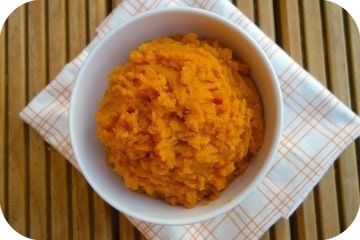
Yes. Served plain with no added ingredients, it is an excellent additive to a dog’s diet. It is healthier than regular white potatoes.
It is commonly used in commercial grain-free, gluten-free, wheat-free dog food recipes. It is easy to bake into treats and can be dehydrated into healthy chews.
Sweet potatoes contain vitamin A which helps with eye health and general immunity, fiber, which aids in digestion, carbohydrates for energy, and antioxidants, which have been linked to cancer prevention (link) (link) (link).
IS MASH POTATOES GOOD FOR GASTRIC UPSET?
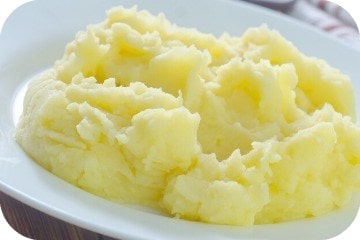
It can be (if served plain), but it is probably not the best option. Sweet potato is a healthier choice than white potatoes.
Plain, easy to digest food is recommended after your dog has suffered diarrhea and vomiting. Commonly rice and chicken are recommended. However, other foods can be used, such as white fish, banana, pumpkin, yogurt (if your dog can stomach lactose), oatmeal, and sweet potato.
All of these should be served cooked, mashed, and plain to help with digestion.
HOW TO MAKE MASHED POTATOES FOR YOUR DOG

Ingredients:
- 5 parts potato
- 1 part cauliflower
- Water
Directions:
1. Peel the potato and chop into bite-sized chunks.
2. Wash and chop the cauliflower in small pieces.
3. Add both the potato and cauliflower to a large pot over high heat.
4. Fill with cold water and bring to the boil.
5. Once boiling reduce the heat to medium.
6. Cover the pot and allow to simmer for 20-25 minutes or until the potatoes are soft.
7. Mash or whip the potato and cauliflower to form a puree. It will be coarser than usual mash due to the absence of dairy.
8. Allow to cool before serving.
Mash can be served in a variety of ways, including:
- Alone as an occasional treat
- Stuffed into a KONG or hollow toy and frozen to be enjoyed later
Remember, treats and additional food should only make up 10% of your dogs’ diet.
DOG TREATS WITH POTATO AND SWEET POTATO

White Potato and Carrot Treats, inspired by Scampering Paws
Ingredients:
- 1 cup potatoes
- Water, for cooking the potato
- 1 medium carrot, shredded
- 1 egg yolk
Directions:
1. Peel the potatoes and chop into small chunks.
2. Add to a large pot and cover with cold water. Bring to the boil, cover the pot, and reduce heat to medium. Simmer for 20-25 minutes, or until soft.
3. Drain, mash, and allow to cool.
4. Preheat the oven to 400 degrees F (205 degrees C). Line a baking sheet with parchment paper.
5. With a fork, combine the mashed potatoes and shredded carrot. Mix in egg yolk.
6. Form the potato mixture into 24 balls.
7. Place potato balls on the baking sheet. Bake for 10-15 or until crisp and golden.
8. Allow to cool before feeding to your dog.
Sweet Vegetable Dog Treats, inspired by The Cook and Him
Ingredients:
- 2 large sweet potatoes
- 1/2 a large carrot, grated
- 3 cups wholemeal flour
- 1 tsp cinnamon
- 1 egg
- 3/4 – 1 cup water, add gradually
Directions:
1. Peel the potatoes and chop into small chunks.
2. Add to a large pot and cover with cold water. Bring to the boil, cover the pot, and reduce heat to medium. Simmer for 20-25 minutes, or until soft.
3. Drain, mash, and allow to cool.
4. Preheat the oven to 350 degrees F (176 degrees C). Line a baking sheet with parchment paper.
5. Add the remaining ingredients and mix and knead to form a dough that you can roll out.
6. Flour your work surface and roll the dough to 1/2-inch thick and cut into your desired treat-sized shape.
7. Bake for 25-30 minutes or until crisp.
8. Allow to cool before serving to your pup.
Natural Chews, inspired by It Doesn’t Taste Like Chicken
Ingredients:
- 2 sweet potatoes
Directions:
1. Preheat your oven to 250 degrees F (131 degrees C). Line a large baking sheet with parchment paper.
2. Cut into slices, cut the slices thicker if you have a larger or stronger chewer, and thinner (but no thinner than 1/4-inch) if you have a smaller dog.
3. Arrange them in a single layer on the baking sheets and bake for 90 minutes. Flip and return to the oven for a further 90 minutes.
4. Allow to cool before serving.
Oat Biscuits, inspired by Pooch and Mutt
Ingredients:
- 2 cups oats
- 1 medium sweet potato
- 2 tbsp coconut oil
- 2 – 3 tbsp water (depending on the consistency of the mix)
Directions:
1. Preheat the oven to 350 degrees F (175 degrees C). Line a baking sheet with parchment paper.
2. Peel the potatoes and chop into small chunks.
3. Add to a large pot and cover with cold water. Bring to the boil, cover the pot, and reduce heat to medium. Simmer for 20-25 minutes, or until soft.
4. Drain and allow to cool.
5. Pop the oats into a blender and blitz until they are coarse and flour-like.
6. Add the coconut oil and cooked sweet potato.
7. Blitz again until all ingredients are well combined.
8. Add water 1 tbsp at a time. Blitz the mixture in between each addition, until it can be made into a dough with your fingers.
9. Transfer to a floured surface and knead the mixture into a ball and roll out to around 1/8-inch thick. Cut into treat-sized biscuits.
10. Add to the tray and bake for 20-25 minutes, or until golden.
FAQS
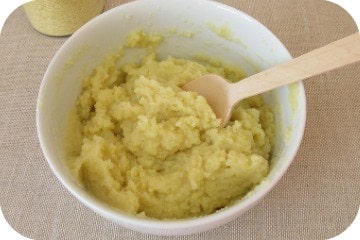
Will instant potatoes hurt dogs?
It depends on the ingredients, avoid any varieties with garlic or onion powder.
Usually, a small portion shouldn’t be dangerous, but it is not recommended regardless due to the high amount of salt and dairy. This can cause gastric upset.
Can a dog eat cooked potatoes?
Yes, as long as they are served plain. Baked or boiled plain are the healthiest option for your dog.
Can dogs eat boxed mashed potatoes?
It’s not recommended. Whether or not it’s unsafe will depend on the ingredients. Look out for high amounts of salt, dairy, and toxic ingredients like onion or garlic.
Looking for more pawsome posts? Check these out…
Can Dogs Eat Lettuce?
How To Make A Snuffle Mat
When Do Puppies Lose Their Teeth?
Can Dogs Eat Broccoli?
Can Dogs Eat Watermelon?
Disclaimer: Each dog is different, and every circumstance is different. All efforts have been made to provide accurate information. However, it is not provided by a qualified Veterinarian, Veterinarian Surgeon, or Behaviorist. The information provided is purely educational. The information should not be used as an alternative or substitute for medical care. If you have any health or medical concerns, contact a qualified Veterinary Surgeon or Veterinarian immediately.
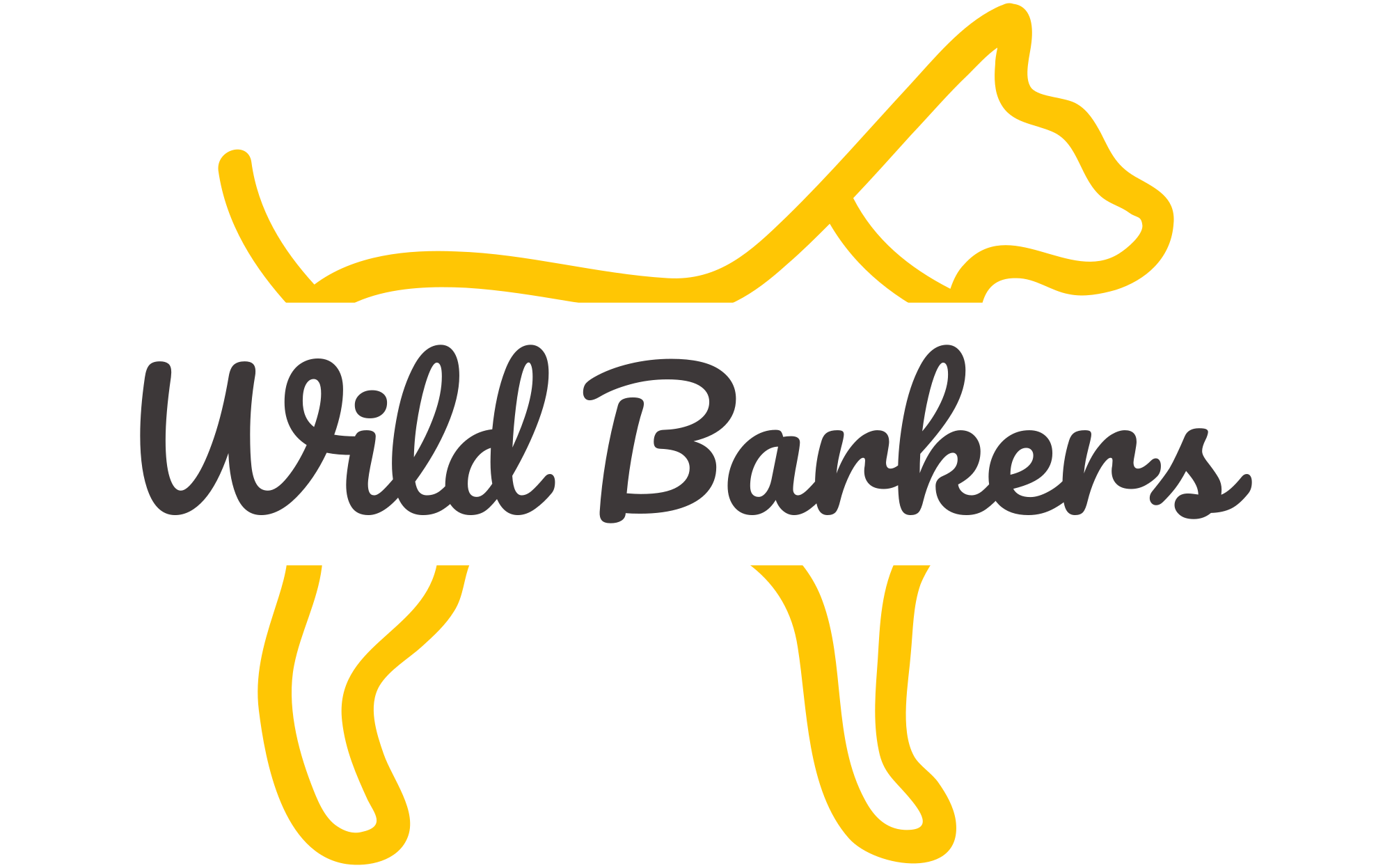





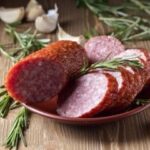
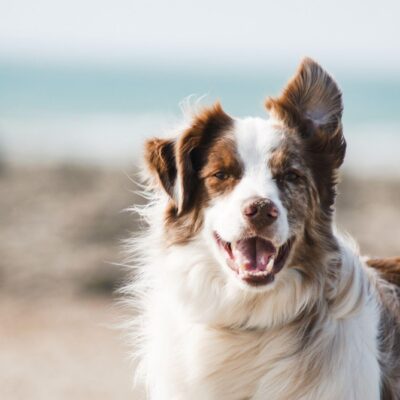
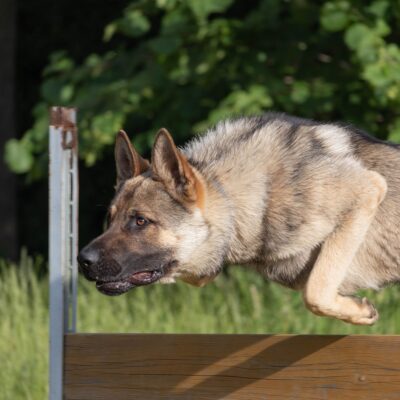
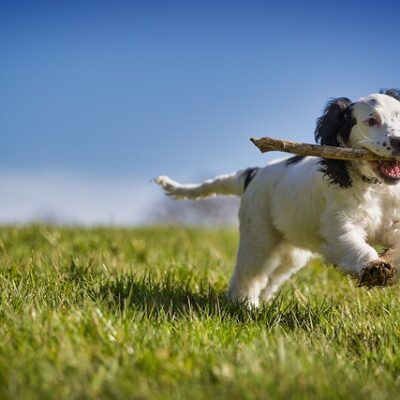
No Comment! Be the first one.